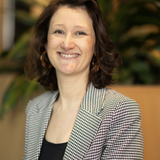Through three episodes in collaboration with FemData, this series unpacks the hidden impacts of data bias, examines the power dynamics driving AI systems and explores policies and initiatives shaping its future. This series seeks to explore building equitable, inclusive and responsible AI technologies that benefit everyone. Join us as we navigate the challenges and opportunities of an AI-driven world. In the first episode, we discuss what data bias is, and how do different disciplines view and define it? How does it shape the systems we rely on, and what impact does it have on our society? During this programme, we will take a closer look at the many faces of data bias. From the ways it is understood in different fields to its far-reaching consequences in different levels of society. Together, we’ll explore how bias in AI systems affects our lives.





About the speakers
Paula Helm is an Assistant Professor specializing in Critical AI Studies and Empirical Ethics, with a background in Anthropology and Peace & Conflict Research. Her interdisciplinary work spans STS, Media Studies, and Technology Ethics. She co-leads the Empirical Ethics Research Group at the Amsterdam Institute for Advanced Studies and coordinates a groundbreaking new MA program that integrates Cultural Studies and AI Ethics, with programming and Data Science. Honored among the “100 Most Brilliant Women in AI Ethics”, Helm’s mission is to embed AI ethics into engineering and development through in-depth empirical inquiry and community involvement.
Aurélie Lemmens is a professor of Customer Analytics at The Rotterdam School of Management (Erasmus University). She works on the development of fair algorithms for better data-driven marketing strategies. She specialized on causal machine learning for targeting and personalization.
Caroline Figueroa is a medical doctor and an Assistant Professor at Delft University of Technology in the Netherlands, where she directs the RISE Group (Research on Inclusion, Social Justice, and Equity in Digital Health). She was recently selected as a Harkness Fellow 2025-2026 and will spend a year in the United States conducting policy-related research on AI-driven mental health tools (apps, chatbots) for young people.
About FemData
FemData is an initiative founded by Myrthe Blösser and Paulina von Stackelberg, two PhD researchers at the University of Amsterdam. Committed to addressing data bias through interdisciplinary approaches, FemData organizes a variety of educational and outreach events. These events are designed to foster meaningful discussions and bring together diverse perspectives to tackle the challenges of bias in data science.




